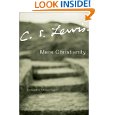Updated Oct 28, 2009 at 2:12 p.m. SEPT - OCT 2009 Edition


|
Home |
Expressions
|
Impressions |
News|
Greek Life |
Education
|
Entertainment
|
Multimedia |
Sports |
Food
|
CulturalLife
|
Games |Travel |Archives
|
Top 5|
ENTERTAINMENT 
Custom Search
|
|
"Movingly 'Mere Christianity' Compels Loving Lord!"
By Caitlin Kempf
Mere Christianity (1952)
Some books never seem to go out of style; they resound with audiences through the generations. First published as a book in 1952, C. S. Lewis’ Mere Christianity is one such work. Lewis writes not for the English scholar but for the everyday reader, skeptic and Christian alike. The book starts with a very basic, straightforward explanation about how there seems to be a “Law of Human Nature” and how it follows that there must be a force beyond humans themselves that puts it to work. Lewis makes it easy to see how God fits into what we already understand in the most scientific of ways. From there, Lewis talks about what Christians believe. One must remember that Lewis was not always a Christian himself—baptized at birth, Lewis was an atheist until age 32. (Fun fact, J. R. R. Tolkien was one of Lewis’ close friends and part of the reason for his conversion.) So, Lewis thoroughly understands the opposing viewpoint. Mere Christianity does not belittle non-Christian ideas, but rather works through them to help the reader make sense of the religion. As a Christian myself, the most interesting part of the book to me was on Christian behaviors. In it, Lewis goes through ideas central to Christian morality, forgiveness, charity, hope, and faith. I was struck by how relevant his words still are today—certainly, he must have seemed revolutionary when first published. I especially liked the chapter on “Christian Marriage”, which gave a different perspective on relationships from what our culture seems to tell us. The last section of Mere Christianity is geared toward people young in their faith or looking to go deeper with it. Lewis fleshes out what he introduces in the other sections, providing a closer look at what it means to be a Christian. He makes sense of the Christian relationship with God, and how God calls us to be new people. In all, it is a fantastic section for anyone who isn’t quite satisfied with their current faith. Mere Christianity has short chapters—5-10 pages—and I read it over several months. It turned out to be the perfect thing to contemplate while brushing my teeth! Take your time in reading this book and reflect on it as you go. You might find that it would be a great evangelism tool or a perfect book study to do a chapter or two a week. Next time you need a book to read, consider picking up Mere Christianity. C. S. Lewis did a lot more for the literary world than just The Chronicles of Narnia! If you would like to read/listen to Mere Christianity online, go to http://www.truthaccordingtoscripture.com/ and click on the “Apologetics” link. Caitlin Kempf is a member of Cornerstone and heads their student prayer team.
|
|
Copyright 2009 Pittsburgh Standard
Reproduction or reuse for profit prohibited without written consent from
Pittsburgh Standard

 The source for picture and info is from
The source for picture and info is from